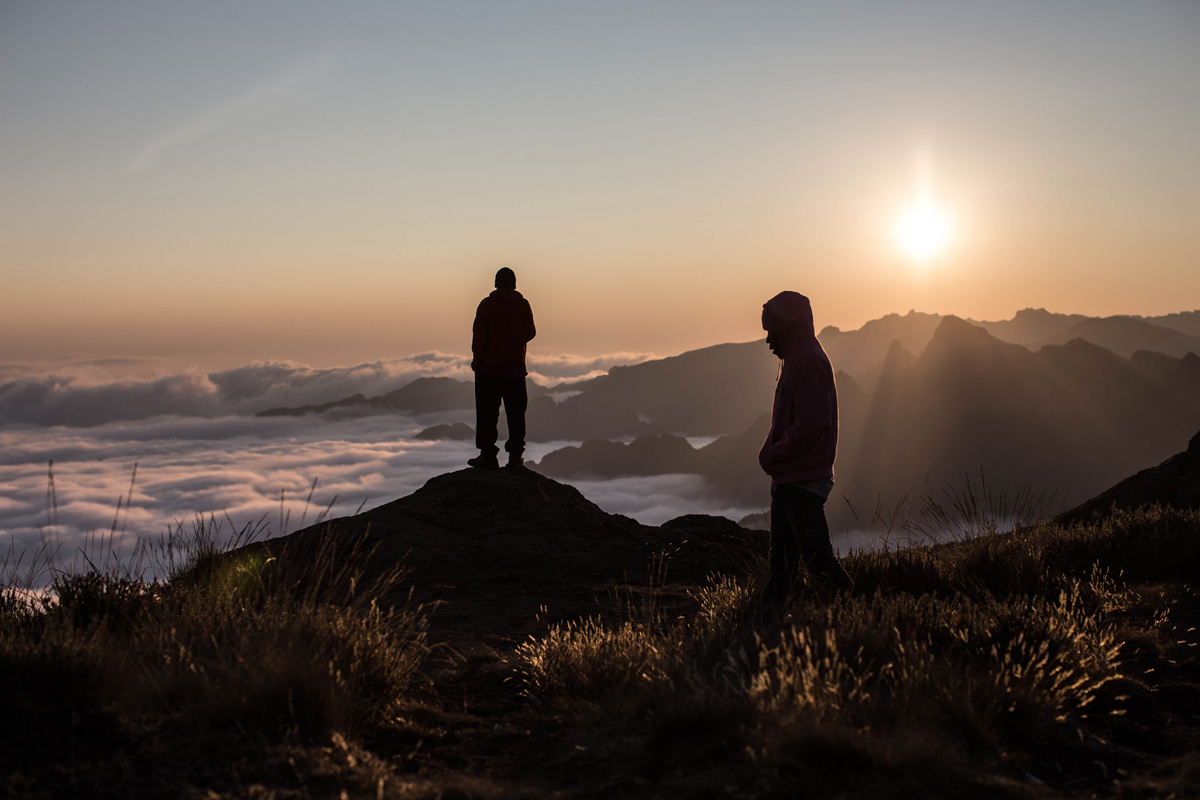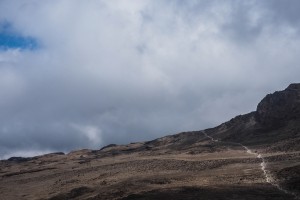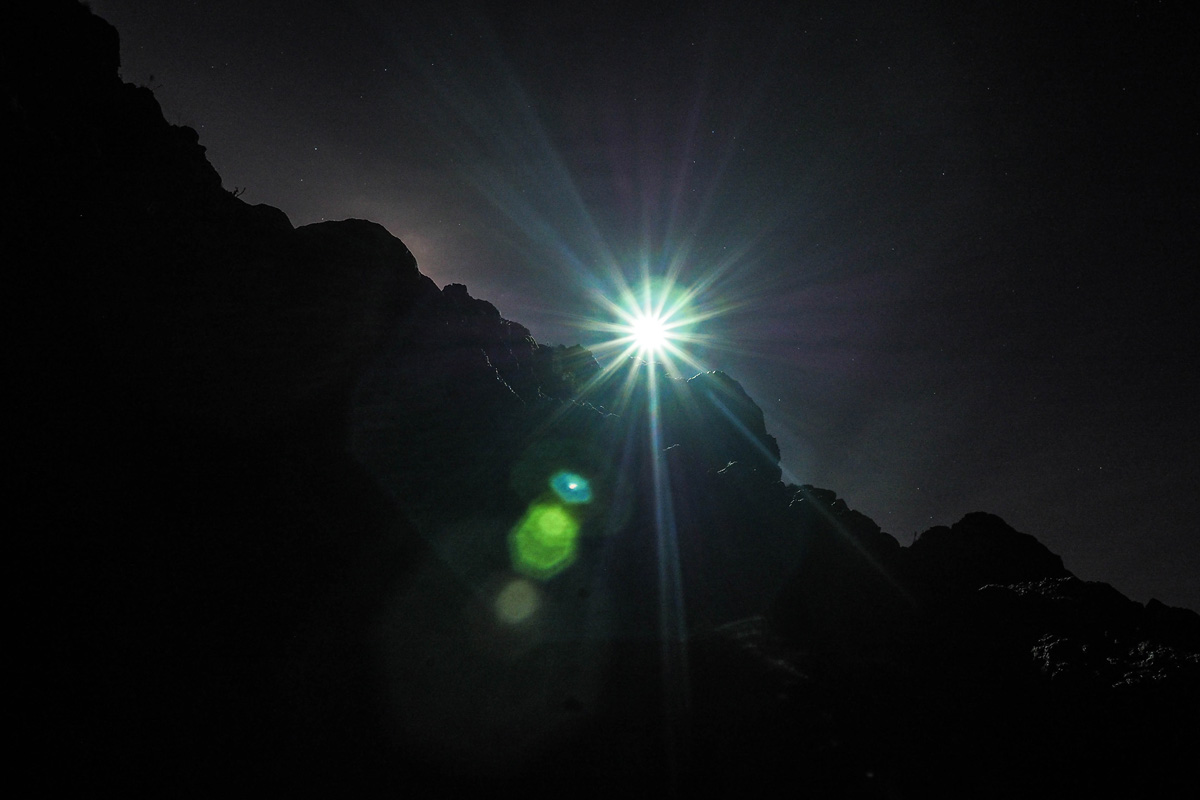The Men of Kilimanjaro
My guide would alternately march ahead of me to set a brisk pace up the ashen volcanic scree and fall far behind me to let me dance alone through the craggy landscape, as he knew I liked to do. He carried a pack that towered above his head with an umbrella strapped to one side and two (never used) trekking poles on other, looking together like some sort of astronaut’s aerial. To shield his face from the wind, he wore a baseball cap and a buff patterned by the Kenyan flag, resembling, as I fruitlessly tried to explain to him, a bandito in a old Western. As we’d pass group after group of plodding tourists, other guides would call out, “Wana nguvu kama simba!” You have the strength of lions! He would wink at me and keep walking.

Hussein Said–a small but wiry man, in conversation also understated but direct, he has guided on the mountains of Tanzania for over a decade, claiming at least one hundred summits of Kilimanjaro alone. The child of Muslim-turned-Christian parents (hence his name) in central Tanzania, he was first a primary school teacher but soon discovered that the short and intense nature of expedition work provided equal pay in a briefer period.
He began work as a porter in 2005. He used the endurance he had built hauling water and farming as a boy to race heavy loads up and down Kilimanjaro’s steep and rocky trails. He was one of few porters who had learned English in school, and this benefitted him significantly. A conversation with two German clients in 2007 changed his life–impressed by his strength and tenacity, they encouraged him to pursue training as a guide.
When Hussein enrolled in a KINAPA (Kilimanjaro National Park) course that operates every three years, he underwent several weeks of basic training in wilderness first aid, terrain navigation, and client care. Ten years later, he has guided groups as large as 39 clients (requiring a small army of porters) to the summit of Africa’s tallest mountain.

Hussein speaks with a curious African drawl, perhaps the result of years of interaction with divers Western accents, as in “Aaah, bwahna, ah’m very sahrry.” He holds himself with the confidence of a much larger man, and the respect afforded him by every guide and porter he passes at his determined but unhurried pace speaks to his reputation as a serious and competent professional.
He is certainly competent, if a bit quirky. He checks every client’s gear to ensure that they are properly equipped with technical and insulating clothing, but personally wears off-brand jeans to an altitude of 4,100 meters. He insists that clients drink three liters of liquid a day, but himself claims to be satisfied with a single cup of tea at dinner. He’ll plod along at a client’s pace of as little as six kilometers in ten hours, but can also virtually run downhill from the summit to gate in less than five, all without slowing down or drinking.

Hussein is an excellent example of the typical mountaineer that works on African mountains. He knows Kilimanjaro’s rippling ridges like the back of his hand (or glove), has climbed in all possible weather conditions, and has seen every possible illness, injury or ineptitude in clients or porters. And yet he has no experience outside of these few, unique, equatorial mountains. There are important geological, environmental, medical facts that he is unaware of, which is not surprising when you consider that he, like most of these men, had only a secondary level education (and even that took him til he was 23 to complete). Although he earns a respectable wage for a Tanzanian, it is still subsistence work, and he must supplement it by tending a small farm. He has eleven siblings, and his father has died. He has to support his siblings, his mother, and himself before he can attempt any other professional endeavour. Further training is expensive and travel is made difficult by government policies and inefficiency.

Still, Hussien displays a cheerful resilience that belies the rigours of his life and work. And this, more than anything, is the most salient common characteristic among the mountain workers of East Africa. They love their work, they love their companions, and they love their environment. Almost every guide I’ve spoken to this summer have told me that even if tourists disappeared from their mountains, they would (and many have) venture up by themselves, just to breathe the air and see the sunrise. As a long-time Kenyan mountaineer, Njenga, reminded me some weeks ago, “You don’t have to have a lot of money to be happy.”
On one cloudy afternoon in Baranco camp, Hussein pulled me aside and told me he had something to show me. He positively bounced from tussock to tussock as he led me down an untrailed gully to a secret underground river he had recently found. Deft and nimble without his cumbersome pack, he maneuvered through some thorn bushes to crouch precariously on slippery moss, where a little waterfall gushed straight out of the cliffside, clearly the sudden manifestation of a long subterranean journey. “Almost no one else knows about this,” he told me gleefully.

Also on our team were the cook Joshua, who carried a small AM radio so as not to miss any football scores, and the indefatigable Japheth, a man as tall and ebullient as Hussein was small and terse. Japheth, who pronounces it “Jofit,” speaks very little English, but considered this of little importance when he would bring a thermos full of fresh hot water and bowl of popcorn and sit down next to me at the mess table. Without preamble, he would launch into subjects as diverse as international politics, African religious tendencies, homosexuality, and, quite fascinating to him, my myriad identity crises as a missionary kid. Although I understood only half of his rapid and effusive Swahili, I attempted to convey complex ideas on why Americans voted for Donald Trump, why gay marriage was legal, and why I considered Kenya to be home. Japheth would chuckle and shake his head at both my fumbled Swahili and my progressive ideals. “Ni maisha yako, ni maisha yangu,” he’d sigh. It’s your life, it’s my life.

We also had Sylvester, who looks no older than nineteen but had two small children, Justin, Samuel, and Leonard. Everyone called Leonard “Suli” because of the neon blue wind-pants he wore when hiking and when asked, Hussein couldn’t remember his real name.
All the men on the mountain greet each other with an exuberant, “Aya, wazee!” This means, essentially, “What’s up, old men?”, which may refer to their posture, weary from hauling loads, or their wonderful, simple sagacity–that indeed, you don’t need much money to be happy.
When I was walking behind Hussein, sometimes we wouldn’t speak for an hour at a time, until he would ask, without turning around, “James, you’re very quiet.”
I said I was enjoying nature.
“Ah,” he said. “Me too.”
More from this Author
Ready to Travel?
Are you curious and ready to dream big? Do you desire to challenge yourself and make a meaningful difference? Become a Lumos Traveler - let’s get you started!



